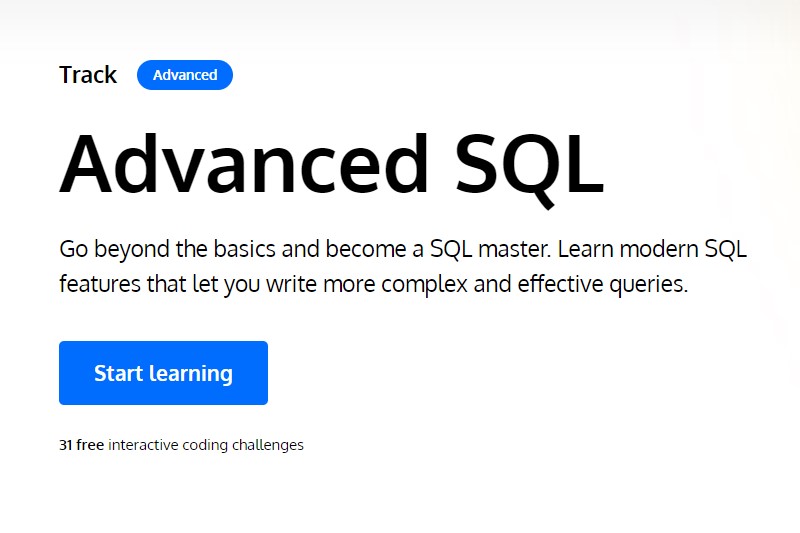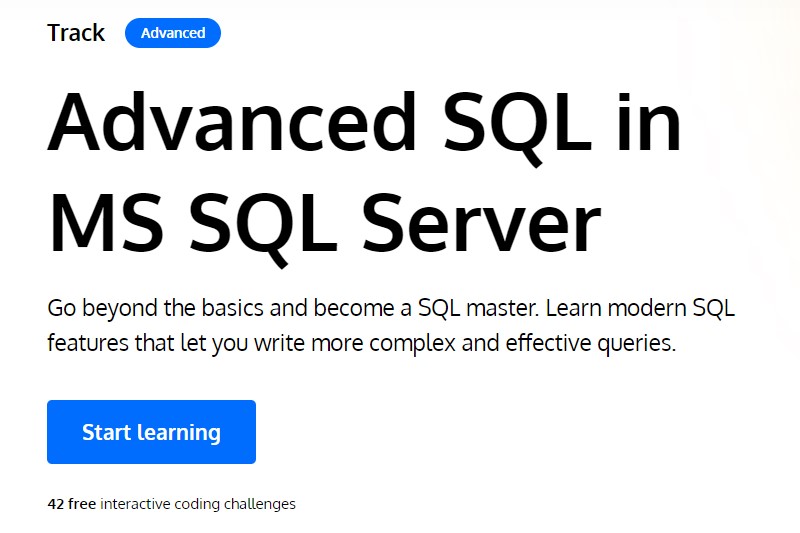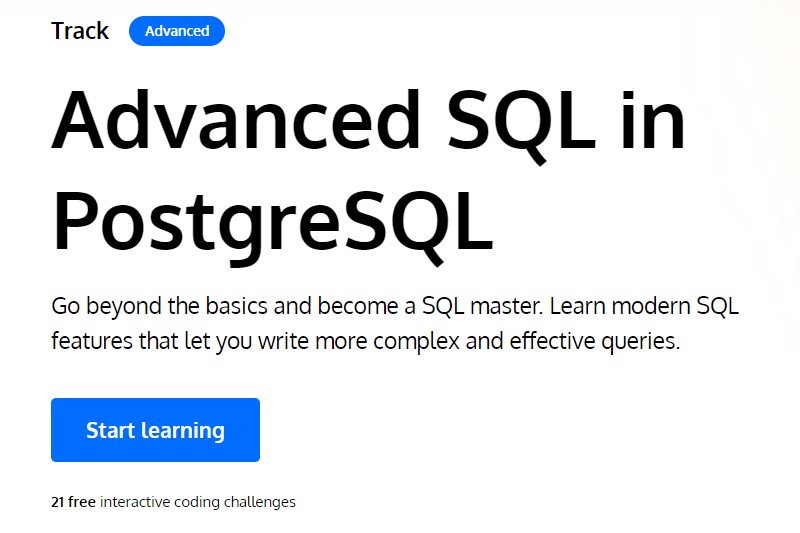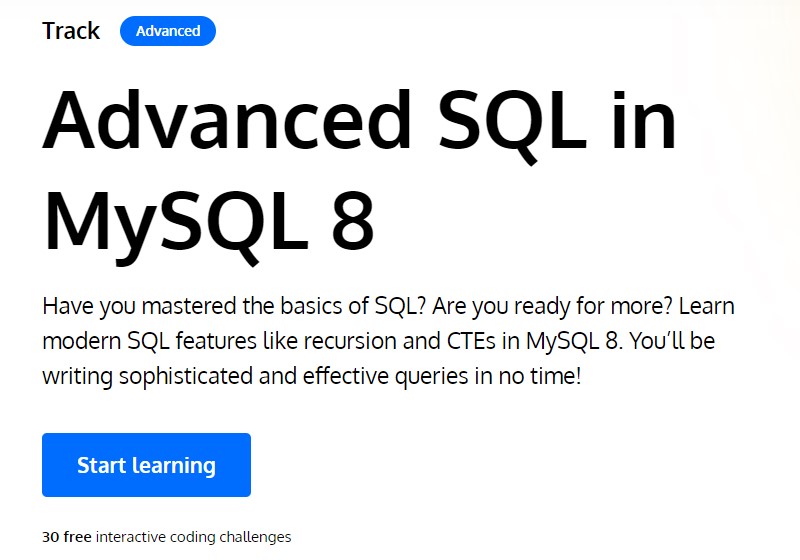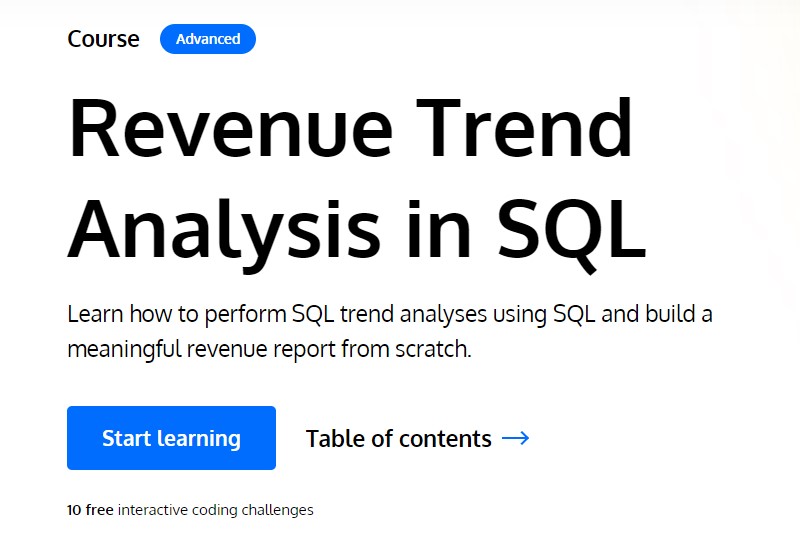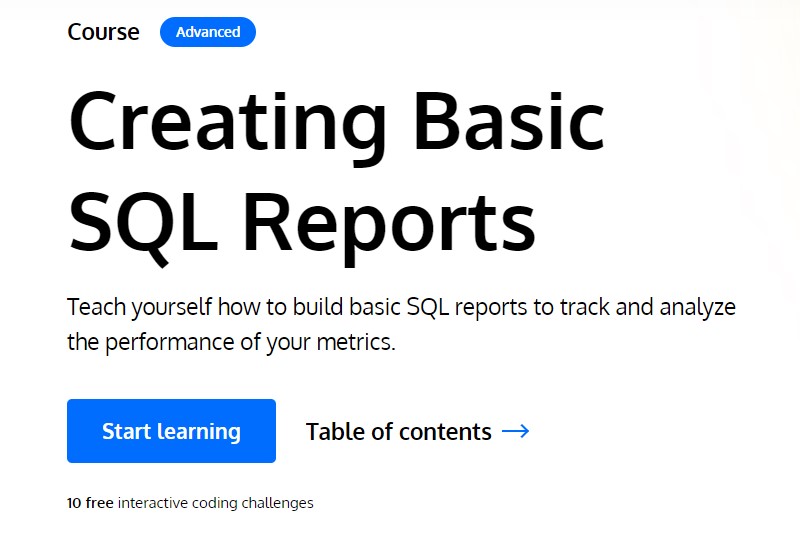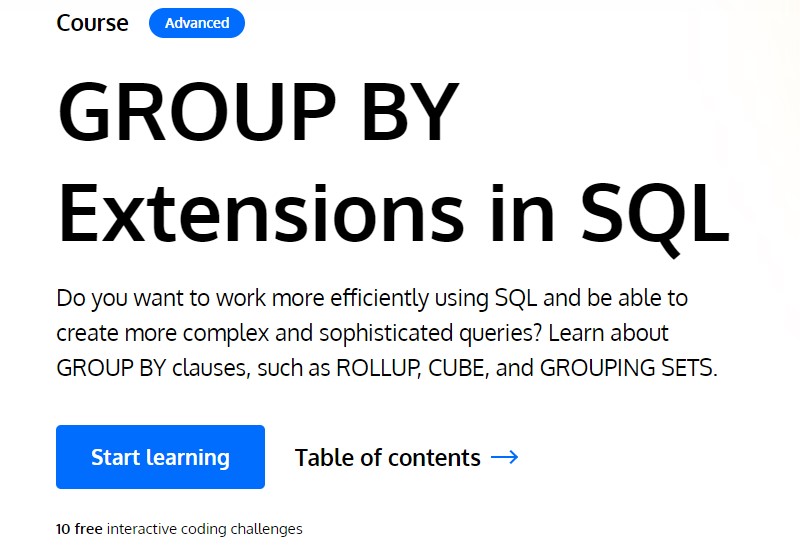The world runs on data, and SQL is the key to unlocking its secrets. If you're ready to level up your SQL game, online training is a power move. But with a dizzying array of options, finding the perfect advanced SQL course can feel overwhelming.
Don't sweat it – I've done the research, so you don't have to. Here's the lowdown on the 7 best advanced SQL courses to fuel your data analysis mastery in 2024.
Course #1: Advanced SQL
Overview:
Advanced SQL promises to take your SQL skills from competent to confident. It dives into complex queries, window functions, common table expressions (CTEs), recursive queries, and advanced GROUP BY clauses, empowering you to slice and dice data with finesse.
Strong Points
- Interactive exercises: Get hands-on with practice problems that solidify the concepts you learn. After all, SQL is a "learn by doing" language, and these exercises make it stick.
- Comprehensive content: The advanced SQL training appears to cover a wide range of advanced topics, ensuring you get a well-rounded SQL education.
Ideal For
- SQL users with a solid foundation who want to explore the full potential of the language.
- Developers who work with large and complex datasets.
Course #2: Advanced SQL in MS SQL Server
Overview:
This course focuses on the nuances of Microsoft SQL Server, catering to those who primarily work within this specific database environment. Expect to learn about Transact-SQL (T-SQL) and the unique features it offers for data analysis.
Strong Points
- Niche focus: A major bonus if you exclusively use MS SQL Server, as the content is likely highly relevant and immediately applicable to your work.
- Potential for in-depth learning: Assuming the course is well-structured, it offers a deeper understanding of T-SQL and its unique functionalities.
Ideal For
- Data analysts and developers working primarily with MS SQL Server databases.
- Those aiming to gain a deeper understanding of T-SQL and its capabilities within the Microsoft ecosystem.
Course #3: Advanced SQL in PostgreSQL
Overview:
Similar to the Advanced SQL course, this LearnSQL.com offering dives into advanced SQL concepts but with a specific focus on PostgreSQL, a popular open-source database management system.
Strong Points
- PostgreSQL specialization: Perfect if you work with PostgreSQL databases and want to become an expert in crafting powerful SQL queries within that environment.
- Potential for well-rounded education: The course likely covers a wide range of advanced SQL concepts, specific to PostgreSQL, providing a comprehensive foundation.
Ideal For
- Data professionals who primarily use PostgreSQL databases.
- Individuals seeking in-depth knowledge of advanced SQL functionalities in PostgreSQL.
Course #4: Advanced SQL in MySQL 8
Overview:
This course targets intermediate and advanced SQL users, delving into advanced SQL concepts specifically for MySQL 8. Get ready to master window functions, common table expressions, recursive queries, and group by extensions to wrangle your MySQL data like a pro.
Strong Points
- MySQL focus: Ideal for those who work extensively with MySQL databases and want to unlock their full potential using advanced SQL techniques.
- Interactive and hands-on: The course emphasizes practical application through exercises, making it easier to learn and retain the material.
Ideal For
- Developers and data analysts who use MySQL 8 databases.
- Individuals seeking to extend their MySQL proficiency with advanced SQL.
Course #5: SQL Revenue Trend Analysis
Overview:
SQL Revenue Trend Analysis goes beyond standard SQL queries, guiding you through the art of revenue trend analysis with SQL. You'll learn how to craft SQL queries to generate insightful reports that track revenue across different time periods and categories, providing valuable insights for businesses to make strategic decisions.
Strong Points
- Practical focus: Centers around a real-world data analysis task, helping you directly apply your SQL knowledge.
- Business relevance: Revenue tracking is crucial for almost every business, making the course broadly valuable.
Ideal For
- People who need to perform revenue analysis using SQL, such as analysts working in sales, finance, or marketing roles.
- Those who want a project-based course to apply SQL skills to a practical business problem.
Course #6: Creating Basic SQL Reports
Overview:
This course teaches you how to use SQL for creating essential reports. Master generating reports for inventory, sales, or other data sets, empowering you to communicate key data insights effectively.
Strong Points
- Essential Skill: Reporting is a fundamental data analysis task that most analysts need at some point.
- Practical foundation: If you're relatively new to SQL reports, this course likely covers the core concepts you'll need.
Ideal For
- Beginners in SQL reporting or analysts who need a refresher on the fundamentals.
- Business professionals who want to extract and present data using SQL.
Course #7: SQL GROUP BY Extensions
Overview:
Explore the powerful world of GROUP BY extensions like ROLLUP, CUBE, and GROUPING SETS. This course unlocks more granular SQL analysis and complex report generation.
Strong Points
- High-value skill: GROUP BY extensions provide a lot of analytical power, making it useful for those digging deep into their datasets.
- Unique offering: Many courses overlook advanced GROUP BY functions, making this a good option if it's your area of focus.
Ideal For
- Intermediate to advanced SQL users who regularly perform complex data aggregation and analysis.
- Individuals who want to create highly customized and sophisticated SQL reports.
Final Thoughts
Choosing the right advanced SQL course is all about aligning it with your specific needs and goals. Think about the database systems you use, the types of analyses you perform, and your current skill level.
There's no single "best," but there's definitely a best sql training course for you. I hope this breakdown gives you enough information to make an informed decision and rock the world of data analysis!
The post 7 Best Online Advanced SQL Training Courses to Learn in 2024 appeared first on RealSQLGuy.


